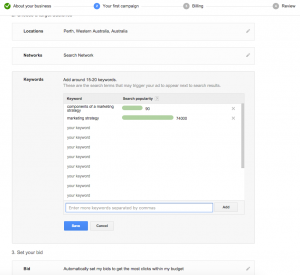
It’s the time of year when we B2B marketers spend our days diligently planning, strategizing, and budgeting for the New Year. These exercises can be time consuming and, in some ways, tedious; but they are pertinent to a successful search marketing strategy.
Even though most enterprise companies have advanced analytics tracking tools (we use Google Analytics to track website visits and actions; Raven Tools to monitor SEO; and Ifbyphone to track call conversions by keyword searched) as well as CRM reporting (we use Salesforce), pulling together and presenting all of the information required for this project is challenging.
Below are the four key questions to address in this process that will help inform your 2015 search marketing budget and plan.
Question one: “Did we see a positive ROI from search marketing in 2014?”
To answer this question, start by putting together a highly detailed overview of your search marketing metrics in 2014. This report should include spend by quarter, by network. Then, for each quarter and each network, determine the number of accounts generated by that spend, and, in turn, the revenue generated by the new accounts created in 2014. You can then use this data to forecast 2015 revenue from accounts created in 2014 and inform budget allocation for 2015.
Search marketing financials overview:
- Look at spend and revenue from accounts created each quarter and their ROI
- Forecast the 2015 revenue from 2014 accounts
- Incorporate average churn rate for 2015 predictions
- Use this data to inform next year’s budget allocations
- Update this quarterly throughout 2015
Question two: “How should we allocate budget across networks in 2015?”
It’s important to use the data collected in the search marketing financial review to decide how to allocate 2015 budget. Use that data to put together a metrics report that includes cost, clicks, impressions, conversions, leads, and opportunities by network. Did the money spent on Google AdWords generate leads and new accounts? Did you spend too much on Bing, or another network? Review the search marketing financials closely to make intelligent allocations for each network in 2015.
Be sure to also include the tools that you may use throughout the year (bid management, SEO monitoring, call tracking, etc.) as part of the budget.
Budget overview:
- Base your plan on successes/failures from 2014
- Allocate highest percentage of budget to network with highest 2014 ROI
- Consider increased budget for events, planned releases
- Consider reduced budget for seasons with historically low lead flow
- Review budget after Q1, make changes as needed
Question three: “How will mobile impact and inform our 2015 approach to search marketing?”
One of the most important areas to strategize for in 2015 is mobile. Since mobile is going to be even bigger in 2015 than it was this year, a thorough strategy will be key to success. The mobile strategy should outline campaign-specific settings, updates to ad copy and collateral, as well as new networks to target in 2015. It should also outline a strategy for mobile CTAs, mobile content, local search optimization, and tracking mobile conversions and web/phone conversions.
Mobile strategy, targeting overview
- Target mobile devices with mobile-specific CTAs, copy, and collateral
- Set budget across mobile and desktop, adjust after data baseline has been established
- Focus in Q1 on mobile optimization, adjust budget accordingly in Q2
Question four: “What activities will I engage in on a daily, weekly, and monthly basis to achieve success in 2015?”
To answer this question, create an outline for the daily, weekly, monthly, quarterly, and yearly tasks that will help accomplish your search marketing objectives in 2015. Daily activities include monitoring paid search spend, keywords, and reviewing traffic in Google Analytics. Weekly should include a search marketing summary report, A/B test results, and more.
Activities breakdown overview
- Increase mobile monitoring, adjusting, and testing across all networks
- Review of PPC call tracking numbers with marketing response team
- Add quarterly and yearly activity plans
Reporting on an entire year’s performance and planning for the next year based on that data is the surest way to produce a positive ROI. It’s labor-intensive, complex, and time-consuming work, but worthwhile in the long run. Whether you run search marketing in B2B or B2C, finding the right time of year to do this activity is a necessity.
What did we miss? Are there methods that you’ve used in performance reporting and budget planning that I failed to mention in this post? Please leave your ideas in the comments section below!
Digital & Social Articles on Business 2 Community
(306)
Report Post





